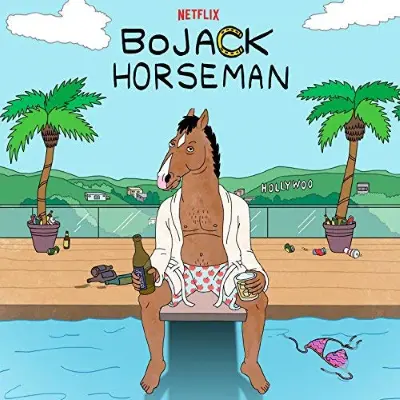BoJack Horseman and The Good Place both say goodbye this week, having similarly changed TV comedy forever
-

"On the surface, glossy sitcom The Good Place and acerbic animation BoJack Horseman do not have much in common," says Rachael Sigee of Michael Schur's four-season NBC comedy and Raphael Bob-Waksberg's six-season animated Netflix comedy. "But with their final episodes dropping this week, the bracket of 'cerebral TV comedy' is losing two shows that have uprooted expectations and shrewdly asked questions of what it means both to be good and to be happy. Neither show is an easy sell: one a high-concept comedy about moral philosophy set in the afterlife; the other an anthropomorphic satire of celebrity culture centered on a Hollywood has-been horse reckoning with his own unhappiness. But both became critical and word-of-mouth successes, providing escapism, wit and warmth, not to mention an unexpected penchant for puns, from The Good Place eateries such as Sushi and the Banshees to BoJack’s endless riffs on celebrities, like Quentin Tarantulino and Cindy Crawfish. There were other similarities, too: both shows feature self-destructive protagonists – BoJack, voiced by Will Arnett, and Kristen Bell’s self-obsessed 'Arizona dirtbag' Eleanor Shellstrop – who begin to recognize the error of their ways and attempt to forge meaningful relationships that, until then, had eluded them. Their momentum is towards betterment, overtly so in The Good Place and far more complicatedly in BoJack, and in direct opposition to most TV comedy they deal in consequences. As each examined what it means to be a good person, The Good Place wrote its ethical lessons on a blackboard while BoJack used animation as a lens through which to make its points, directly naming men implicated by real-world scandals, as the show tackled its own corresponding #MeToo storyline." ALSO: BoJack Horseman vs. The Good Place: "The moral universe of BoJack is darker and messier than its NBC counterpart."
TOPICS: BoJack Horseman, NBC, Netflix, The Good Place
More BoJack Horseman on Primetimer:- Stealing Boggle Trophies: When Celebrities Take on the Villain Cameo
- By the Numbers: Which Netflix Shows Have Run for 5 Seasons or Longer?
- BoJack Horseman creator responds to Dave Chappelle controversy by revealing a David Fincher joke Netflix forced him to cut to raise money for a trans charity
- The Best UK-Style Holiday Specials on Netflix
